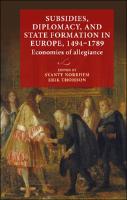Subsidies, diplomacy, and state formation in Europe, 1494–1789
Economies of allegiance
Contributor(s)
Norrhem, Svante (editor)
Thomson, Erik (editor)
Language
EnglishAbstract
French subsidies played a central role in European politics from Charles VIII’s invasion of Italy in 1494 until the French Revolution. French kings attempted to frustrate what they viewed as a Habsburg bid to pursue universal monarchy. During the seventeenth century, the French monarchy would embrace the payment of subsidies on a different scale than previously, using alliances in which subsidies played a prominent role to pursue crucial aspects of royal policy. Louis XIII made alliances promising subsidies to support the United Provinces’ resumed war against the king of Spain, and for the Danish, Swedish, and various German princes to fight against the Holy Roman Emperor. Louis XIV continued some of these subsidies and used subsidies as a tool in order to implement his own politics. When Louis XIV appeared to Dutch and some English statesmen as aspiring to Universal monarchy, the Dutch and particularly the English used the tool of subsidies to frustrate the French monarch. During the eighteenth century, principally the French and the British, but also the Austrians, used subsidies to procure allies and attempt to maintain the balance of power. The subsidy system prompted significant debates about the legal, political, and moral implications, and was sometimes a source of political conflict between competing power groupings within states. The book argues that participation in the French system of subsidies neither necessarily accelerated nor necessarily retarded state development; but such participation could undoubtedly change political dynamics, the creation of institutions, and the form of states that would emerge.
Keywords
subsidies; pensions; early modern Europe; international relations; war financingPublisher
Lund University PressPublisher website
https://www.lunduniversitypress.lu.se/Publication date and place
Lund, 2020Classification
History and Archaeology
c 1500 onwards to present day
Diplomacy
Europe


 Download
Download Web Shop
Web Shop